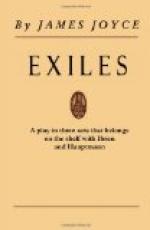|
This section contains 13,291 words (approx. 45 pages at 300 words per page) |

|
SOURCE: Henke, Suzette A. “Interpreting Exiles: The Aesthetics of Unconsummated Desire.” In James Joyce and the Politics of Desire, pp. 85–105. New York: Routledge, 1990.
In the following essay, Henke provides an analysis of Exiles and its characters.
Where does desire come from? From a mixture of difference and inequality. … It is inequality that triggers desire, as a desire—for appropriation.
(Hélène Cixous, “Sorties”)
Act One: Passio Irascibilis
Exiles, Joyce's single dramatic work, served as an important vehicle for the author's complex, sometimes convoluted investigation of heterosexual and homoerotic desire. Although Exiles may resemble a turn-of-the-century problem play, it offers, from a psychoanalytic standpoint, a provocative exploration of sexual and psychic mobility.1 Like August Strindberg before him, Joyce is obsessed with the “name of the Father” as an index of authority and authorized familial identity. And he knows, instinctively, that the “merest hint of the mother's infidelity threatens...
|
This section contains 13,291 words (approx. 45 pages at 300 words per page) |

|


